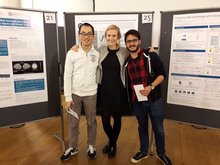The poster prize winners of the 11th M&B Poster Presentations are:
First prize
FRIEDERIKE IRMEN (Cohort 9/2015)
M&B Supervisors: Andrea Kühn, Hauke Heekeren
Poster title: "Subthalamic stimulation restores adequate risk-reward trade-off decisions in Parkinson's Disease"
Abstract: Subthalamic deep brain stimulation (STN DBS) effectively treats motor symptoms of advanced Parkinson’s Disease (PD), however its influence on nonmotor symptoms of the disease is unspecific posing a challenge for clinicians. In the cognitive domain, DBS can either be beneficial or worsen nonmotor symptoms like impulse control or decision-making. A potential factor influencing the modulatory effect of STN DBS on nonmotor symptoms is the functional position of the volume of tissue activated (VTA) by the electrode contact and the weighted stimulation of motor versus nonmotor basal ganglia loops. Such modulation by VTA location has not yet been linked to nonmotor symptoms of PD in the cognitive domain. We here aim to investigate whether STN DBS influences risk-reward trade-off decisions and interaction with VTA in motor versus nonmotor STN.
Second prize
YUAN-HAO WU (Cohort 9/2015)
M&B Supervisors: Felix Blankenburg, Hauke Heekeren
Poster title: "Human oculomotor system encodes perceptual choices independent of sensory inputs and motor outputs"
Abstract: Decision making has been intensively studied in monkeys and humans using vibrotactile frequency discrimination tasks [1-4]. Results from monkey electrophysiology and human EEG suggest that perceptual choices are encoded in a sensorimotor network. However, these studies did not fully dissociate perceptual choices from sensory inputs and motor plans. To overcome this limitation, we devised an experimental paradigm which enabled the decoupling of choice-related brain signals from those related to sensory inputs and motor plans. We recorded fMRI data from 30 participants while they performed the modified version of vibrotactile frequency discrimination task wherein they indicated their perceptual choices with saccades. Multivariate pattern analysis was applied to test which human brain regions encode perceptual choice in this type of somatosensory decisions. In line with previous studies [1,2], we revealed choice-specific activity patterns in the prefrontal regions. Most interestingly, choice-specific BOLD signal was also evident in the oculomotor system including the bilateral intraparietal regions and the frontal eye fields although the direction of impending saccadic responses was not predictable. Choice-specific information in oculomotor network suggests a response modality-dependent encoding of perceptual decisions in humans, even for abstract perceptual choices which are decoupled from the motor plans. The finding partially corroborates the embodiment account of decision making [5]. Further research should address the question of whether choice-specific representations are generated in the oculomotor system or elsewhere.
Third prize
JUAN R. LOIZA (Cohort 10/2016)
Supervisors: Michael Pauen, Isabel Dziobek, Jesse Prinz
Poster title: "Emotions, folk-psychology, and natural kinds"
Abstract: In the field of emotions, there has been a growing concern regarding whether emotions are scientifically respectable objects of study. These concerns are motivated by what Barrett (2006) calls the natural kind view. According to this view, emotions can only be scientifically respectable if they form a natural kind, i.e. a class of objects on which we can make inductive inferences. Since empirical research has shown that emotions are heterogeneous, the natural kind status of emotion, and hence its epistemic value as a category, seems dubious. Yet, against this pessimistic conclusion, I argue that emotions can be rescued by defining them as functional kinds. By moving towards functional descriptions, we can account for heterogeneity in terms of multiple realizability. To do this, I suggest studying emotions from a folk psychological perspective and abstracting towards functional descriptions that capture relevant properties for the explanatory demands of psychology and neuroscience. In my poster, I sketch the main tenets of such view.
Congratulations to our winners, to their supervisors, collaborators, and mentors, and thanks to all doctoral candidates, Master's students, postdocs, and our friends from UCL Institute of Neurology who presented their posters and/or contributed to this wonderful event by discussing and voting for posters!



